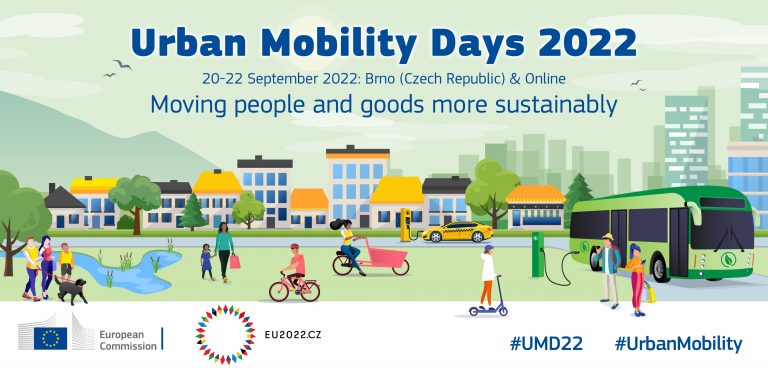From 20 to 22 September, Brno will host the Urban Mobility Days 2022 event. Photo credit: EUMD
Brno, 17 Aug (BD) – This biennial conference, jointly organised in 2022 by the European Commission, Directorate-General for Mobility and Transport (DG MOVE), and the Czech Presidency of the Council of the EU, is a major event in the European urban mobility calendar. After being conducted online in 2020 due to COVID-19, this year’s edition will be held in person, though it will still be possible to participate online.
As 2022 is the European Year of Youth, the Urban Mobility Days bring the voices and perspectives of young people to the forefront, to engage them in the journey of awareness and action regarding the climate crisis. The theme of this year’s conference is “Moving people and goods more sustainably”; over three days, expert participants from all over the world will examine all aspects of sustainable urban mobility, debating the latest challenges and solutions.
To link the European Commission’s initiatives on urban mobility, this year’s conference coincides with the European Mobility Week, the European Commission’s awareness-raising campaign on sustainable urban mobility, which takes place from 16 to 22 September each year in more than 3,000 cities in 50 countries around the world. The annual theme for 2022 is “Better Connections”.
More than 70% of Europeans live in cities and urban areas are responsible for about 23% of the EU’s greenhouse gas emissions. It is therefore necessary to open a discussion on how to support and transform urban mobility in a sustainable way. The Urban Mobility Days provide a forum for politicians, local authorities, academics, NGOs, urban transport operators and urban planners to connect and discuss the way forward for a sustainable, innovative and equitable future of European urban mobility.
This year’s programme will feature a series of panel discussions, thematic sessions, exhibitions and side events. Discussion topics range from encouraging active travel to financing climate neutrality, from zero emission zones to strengthening urban nodes in the TEN-T network.
The first two days will be filled with lectures of about 90 minutes, starting at 9am and ending in the afternoon. These will not be face-to-face lectures, but rather expert panel discussions with the involvement of the audience. The aim is to educate through discussion, with interaction playing a crucial role in this year’s conference.
The opening topic on 20 September will be “Mobility powered by youth”, at 9am in the round room. Doctoral and master’s students will join academics to create an interactive panel discussion on “What does the future of urban mobility look like and how can young people participate in shaping it?”.
The closing session will take place on 22 September at 11.30am with the topic “The future of urban mobility as seen by young people”. The closing plenary will bring together representatives of the European Commission and the young speakers of the different conference sessions in an interactive debate. On this occasion, participants will summarise and share their views on the future of urban mobility in Europe.
To see the full programme go to the official website.







